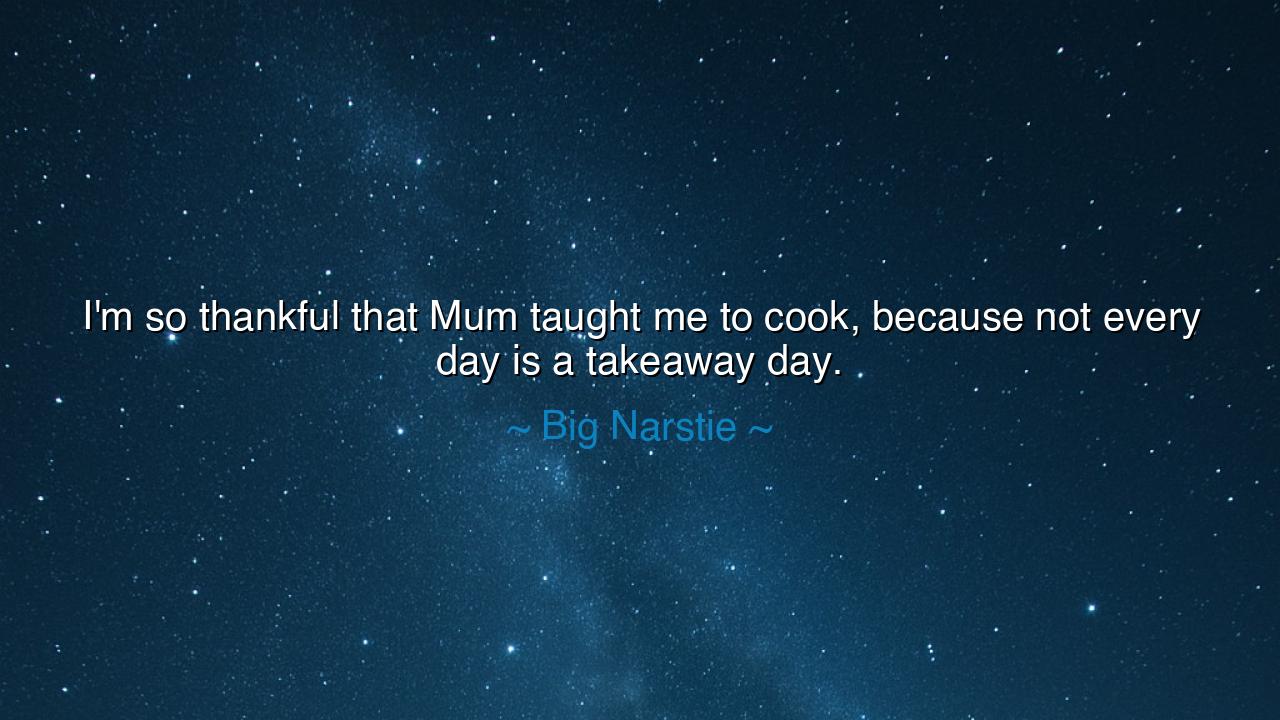
I'm so thankful that Mum taught me to cook, because not every






The words of Big Narstie shine with the humble wisdom of daily life: “I’m so thankful that Mum taught me to cook, because not every day is a takeaway day.” Though spoken with humor and simplicity, this saying carries a depth of meaning that reaches beyond the kitchen. It is not merely about food, but about preparation, resilience, and the inheritance of life-skills passed from one generation to the next. His thankfulness reveals an eternal truth: the lessons given by parents, especially the small, practical ones, often prove to be the foundations of survival and independence.
To be taught to cook is more than learning recipes—it is learning self-sufficiency, patience, and the art of sustaining one’s body with one’s own hands. Narstie acknowledges that while luxuries like takeaway meals may satisfy in the moment, they cannot sustain life every day. Real strength lies in the ability to provide for oneself, to create nourishment from the raw and simple. In his gratitude to his mother, he honors not only the act of cooking but the deeper gift: the power to endure when convenience fails, the dignity of standing on one’s own.
The ancients held similar wisdom. In Rome, Cato the Elder insisted that young men learn the practical tasks of farm and household, for he believed that self-reliance bred discipline and strength. In Greece, the Spartans were taught not only to fight but to prepare their own meals, believing that dependence weakened the warrior spirit. In every culture, those who learned to sustain themselves without leaning too heavily on luxury were the ones who endured hardship. Just as Narstie’s mother equipped him with a simple yet essential skill, so too did the ancients recognize that the greatest gifts parents give are not treasures of gold, but tools for life.
The phrase “not every day is a takeaway day” speaks to the unpredictable nature of life. There will be times of abundance, when pleasures are within reach, but there will also be times of scarcity, when one must fall back upon discipline and skill. Life is not a banquet without end—it is a rhythm of feast and famine, of ease and labor. Those who rely only on abundance are left helpless when it vanishes, but those who carry the wisdom of their mothers, fathers, and elders will find themselves prepared. Gratitude, then, is owed to those who instill resilience before it is needed.
His words also carry the fragrance of family and tradition. Cooking is not just survival—it is connection. It is the way mothers pass love to their children, not always through words, but through the meals that sustain their bodies and spirits. To learn to cook is to carry that tradition forward, so that love may continue to flow through generations. Narstie’s gratitude to his mother is thus also an acknowledgment of heritage, the unseen thread of care that binds him to his roots.
From this teaching emerges a lesson for all: value the simple skills, and cherish the ones who gave them to you. Do not despise the humble act of learning to cook, to mend, to build, to care—for in times of need, such skills prove more precious than wealth. Be thankful for the elders who taught you, and honor their lessons not only with words but with practice. For these lessons are a shield against hardship and a foundation for independence.
Therefore, let each of us act. Remember the gifts your parents or mentors passed down, however small they may seem. Practice them, preserve them, and pass them on to others. Do not depend solely on luxury, but cultivate resilience, so that when life withholds its conveniences, you will stand unshaken. And above all, live with gratitude, as Big Narstie does, knowing that behind every simple skill lies the love of someone who prepared you for the battles of life. In this way, the wisdom of his words becomes eternal: be thankful for the small lessons, for in them lies the power to endure.






AAdministratorAdministrator
Welcome, honored guests. Please leave a comment, we will respond soon